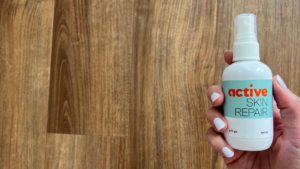The instinctual drive to keep your baby safe and healthy is one of the strongest we have. We love these little humans and want to give them the best possible environment for them to thrive. Whether your baby is a delicious, fuzzy newborn, or a fiery, teething nine-month-old, here are three supplements you can consider adding to his or her daily routine.
VITAMIN D3
Did you know that vitamin D3 actually functions as a hormone? This tiny yet mighty compound is a very important nutrient for optimal immune system function and bone development. Almost every cell in the body contains vitamin D receptors!
Even though vitamin D is made in skin cells when they interact with sunlight, most adults in this country are still deficient. Newborns see even less sun time and if your baby is breastfed, supplementation is especially important. Although infant formula brands are fortified with vitamin D3, I still recommend supplementing a few times weekly for formula-fed babies during the winter months, for babies who live in northern climates, or babies who do not have intentional sun exposure regularly.
The standard daily dose of vitamin D3 for an infant 0-12 months old is 400 IU (international units), or 10 mcg (micrograms). My favorite brand (no paid/sponsored brand associations here) of vitamin D3 is Nordic Naturals Baby’s Vitamin D3. I prefer this brand and others like it because the carrier oil for the vitamin D3 is organic extra virgin olive oil, whereas other brands may contain unsustainable GMO palm oil. You can find this and the other suggested supplements in this article for 15% off on my online pharmacy, Fullscript. Vitamin D3 is easiest administered in dropper form, as you can drop it right into your baby’s mouth, onto your nipple or bottle nipple prior to feeding, or right into a bottle of milk. This is a fat-soluble vitamin that can reach dangerous levels in the body if too much is taken over a long period of time, so be sure to follow exact dosing instructions.
DHA (DOCOSAHEXAENOIC ACID)
DHA is an omega-3 fatty acid that is essential to the health and development of your baby’s brain and eyes. It is commonly derived from fish like salmon and mackerel, as well as eggs and algae. Although the body can make very small amount of DHA on its own, this is an inefficient process so it must be obtained via a combination of diet and supplementation. I generally support food as the main source of obtaining certain nutrients, but in order to get the ideal amounts of daily DHA from just marine and egg sources alone would also result in potentially unsafe mercury exposures.
If you are pregnant and reading this, I highly recommend aiming for 1-2 grams of DHA per day – between diet and supplementation. Pregnancy demands huge quantities of DHA from the mother, and this continues throughout breastfeeding. I recommend that nursing women continue with high-dose fish oil throughout breastfeeding. Repleting nutrient stores (like DHA) after pregnancy takes up to one year postpartum. Consult with your first doctor if you have bleeding or clotting disorders, or are taking blood pressure medication.
The standard daily dose of infant DHA is dependent upon weight, so check the bottle and remember to change your dose as your baby grows bigger. This dose can be anywhere from 100mg per day to 1000mg per day. Both breastfed and formula fed infants can benefit from DHA supplementation. I prefer the infant DHA by Nordic Naturals because I trust the third-party heavy metal testing of this company, and I agree with the dose-per-weight chart that they recommend. If your family is vegetarian or vegan, Nordic Naturals makes an infant DHA liquid made from marine algae.
PROBIOTICS
Gut health and the microbiome may be the hottest health topic of the last decade. The health benefits of probiotics have been flooding research studies, medical conferences and internet blogs for years – and for good reason. The human body functions in a commensal partnership with bacteria that provide many vital health benefits like making vitamin B12 through fermentation in the intestine.
Until recently, bacteria seemed to imply sickness and infection only. Sometimes infections happen just because “good” bacteria from one area gets into an area it’s not meant to be and then becomes “bad.” Sometimes it grows too much in one area and then becomes a problem. Sometimes we take antibiotics to clear a bacterial infection that then also kills off the good bacteria in the area, and now that environment is even more at risk for another infection. We know that lacking certain strains of bacteria in the gut puts us at greater risk for things like allergies, eczema, obesity and even type 2 diabetes. It’s a subtle yet extremely important system of checks and balances that can be aided by the use of oral probiotics.
Probiotic supplementation is generally considered safe for the vast majority of babies. They are particularly helpful for babies born via cesarean section, babies who have been on antibiotics and babies who are having colic-like symptoms or other gastrointestinal issues like diarrhea. Probiotics can also be given daily for preventative health. Most brands come as liquid drops or powders that can be mixed with milk or water and given in a bottle or via a spoon. Powdered forms can also be “sucked” off of a nipple tip or finger.
The daily dose of infant probiotics is not standardized at this time and can range from 1-10 billion CFU (colony-forming units) per dose. Children may take between 5-25 billion CFU, and adults between 20-50 billion CFU. If you notice GI upset in your child upon starting probiotic supplementation, try backing off the dose until symptoms pass, then gradually increase back to the recommended dose. My favorite brands of infant probiotics include MetaKids Baby Probiotic drops by Metagenics (shake well before administering), Evivo satchels, or Ther-Biotic for Infants powder by Klaire Labs.
DISCLAIMER: This article is not meant to be interpreted as medical advice. This is purely for informational and educational purposes only. Milk Medicine supports body autonomy, body literacy, open access information, and informed consent. The health of you and your family is your own responsibility. As always, discuss any medical questions or concerns with your physician or pediatrician.
FOR 15% OFF THE SUPPLEMENTS MENTIONED IN THIS ARTICLE, VISIT MY ONLINE PHARMACY, HERE.




